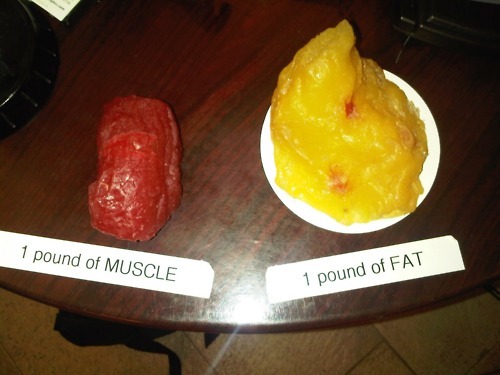Rocks and feathers weigh the same!
One pound of rocks weighs the same as one pound of feathers....the feathers just take up more room.
And yes one pound of fat weighs the same as one pound of muscle.
One cup of muscle, however, is heavier than one cup of fat.
Why does everyone keep insisting muscle weighs the same as fat? Muscle is denser than fat so it does weigh more when the volume is the same. These people who keep insisting that a pound is a pound must think everything in the world is the same weight since a pound of feathers weighs the same as a pound of rocks. Apparently nothing is light or heavy.... It's just bigger and smaller quantities! When comparing weight on something the assumption is the volume is the same. So muscle does weigh more than fat!
Done rant! :flowerforyou:
And yes one pound of fat weighs the same as one pound of muscle.
One cup of muscle, however, is heavier than one cup of fat.
Why does everyone keep insisting muscle weighs the same as fat? Muscle is denser than fat so it does weigh more when the volume is the same. These people who keep insisting that a pound is a pound must think everything in the world is the same weight since a pound of feathers weighs the same as a pound of rocks. Apparently nothing is light or heavy.... It's just bigger and smaller quantities! When comparing weight on something the assumption is the volume is the same. So muscle does weigh more than fat!
Done rant! :flowerforyou:
0
Replies
-
Someone is feeling argumentative today.

When comparing weight on something, who is assuming volume is the same? If someone wants to talk about volume, lets talk about volume. If, however, you want to say a pound of muscle weighs more than a pound of fat, I am one of those disagreeable people as I am never assuming volume is the same as weight. It's two different measurements.
If you are measuring a cup of muscle or fat for volume, of COURSE muscle will be heavier. However, if you measure a cup as 8 ounces of weight, you will have more fat volume and less muscle volume but they will weigh the same.
It is kinda like how factories package their chips for weight not volume. You can get a bag that has nothing but crumbs in it that weighs the exact same thing as a package in which none of the chips are broken. The unbroken ones take up more room than the broken ones but it all weighs the same.
"What weighs more, a pound of bricks or a pound of feathers?" would not be an elementary school logic question that trips up people who think volume is the same as weight if similar volume were the correct assumption to make.0 -
"What weighs more, a pound of bricks or a pound of feathers?" would not be an elementary school logic question that trips up people who think volume is the same as weight if similar volume were the correct assumption to make.
Actually it's because constant volume is the default assumption that this question trips people up.
I'm with the original poster here. Obviously when people say "muscle weighs more than fat," they mean muscle is more dense than fat. The context is nearly always a discusion of losing inches while not losing pounds, which makes very clear that folks are talking about density It's funny how vehement people get insisting on the word game that muscle and fat weigh the same because a pound is a pound.0 -
"What weighs more, a pound of bricks or a pound of feathers?" would not be an elementary school logic question that trips up people who think volume is the same as weight if similar volume were the correct assumption to make.
Actually it's because constant volume is the default assumption that this question trips people up.
I'm with the original poster here. Obviously when people say "muscle weighs more than fat," they mean muscle is more dense than fat. The context is nearly always a discusion of losing inches while not losing pounds, which makes very clear that folks are talking about density It's funny how vehement people get insisting on the word game that muscle and fat weigh the same because a pound is a pound.
You're right, it is a word game (just like your correction of my use of similar with your use of constant). But it is still true that a pound is a pound when we're talking weight and not volume. I know what context she's talking about; I've seen the posts.
Losing inches but not weight means they are losing volume not that volume is static/constant/similar. Volume's definition is the amount of space occupied by a three-dimensional object or region of space, expressed in cubic units. So if the inches are going down, so is volume. Why would one then assume volume is the same when the only constant in "losing inches but not losing weight" is weight?0 -

Enough said?0
This discussion has been closed.
Categories
- All Categories
- 1.4M Health, Wellness and Goals
- 398.2K Introduce Yourself
- 44.7K Getting Started
- 261K Health and Weight Loss
- 176.4K Food and Nutrition
- 47.7K Recipes
- 233K Fitness and Exercise
- 462 Sleep, Mindfulness and Overall Wellness
- 6.5K Goal: Maintaining Weight
- 8.7K Goal: Gaining Weight and Body Building
- 153.5K Motivation and Support
- 8.4K Challenges
- 1.4K Debate Club
- 96.5K Chit-Chat
- 2.6K Fun and Games
- 4.8K MyFitnessPal Information
- 12 News and Announcements
- 21 MyFitnessPal Academy
- 1.5K Feature Suggestions and Ideas
- 3.2K MyFitnessPal Tech Support Questions



